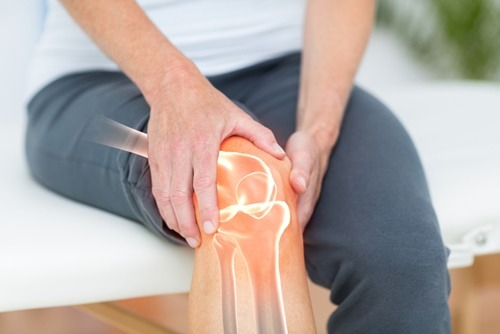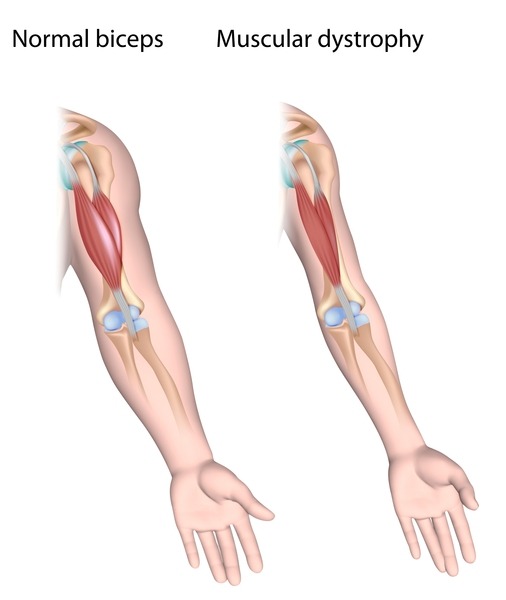Muscle Weakness in Legs: Causes and Treatments

After a long day of work or standing, you may experience some weakness in legs. But, it can also occur at other times during the day even if you are not moving around.
So, you may be thinking about why your legs are weak right now? This can be caused by a variety of things and might be something very minor.
Muscle weakness in legs and hips occurs either as a sensation or if your muscles are fatigued enough that they lose strength. If you are experiencing a sudden weakness in legs it may be attributed to a more serious condition.
What Causes Weakness in Your Leg Muscles?
 What causes weakness in legs? There are many different things that can cause muscle weakness in legs. A few of them are related to your back health.
What causes weakness in legs? There are many different things that can cause muscle weakness in legs. A few of them are related to your back health.
1. Herniated Disk
If you have experienced an injury or accident that has affected your spine then you may also have weakness in legs. A herniated disk in the lower or upper back is one of these causes.
Your spine is made up of twenty-six bones called vertebrae. In between these bones are soft disks filed with a jelly-like substance. These disks act as a cushion so that the vertebrae do not grind against each other.
A slipped or herniated disk is likely to happen due to the strain on the back. This can occur during heavy lifting and older people tend to have a higher risk of injury. The pain associated with a slipped disk usually goes away within six weeks.
If the pain lasts longer you should consult a doctor.
2. Becker Muscular Dystrophy

Becker muscular dystrophy is an inherited disorder that involves slowly worsening muscle weakness of the legs and pelvis.
This genetic disorder is unfortunately considered irreversible, but symptoms can be effectively managed with treatment.
3. Pes Cavus

Pes cavus is also another cause of weakness in legs. This is a high arch of the foot that does not flatten with weight bearing. This foot type can cause pain.
4. Wernicke-Korsakoff Syndrome
Wernicke-Korsakoff syndrome is a condition that affects the brain due to low vitamin B1 levels. Symptoms can be a loss of balance, drowsiness, staggering and confusion. If it gets worse, you may also suffer from memory loss. This is a chronic condition but there is a treatment to prevent worsening.
5. Adrenoleukodystrophy
Adrenoleukodystrophy is a word that describes a family of closely related inherited disorders of fat metabolism. It is a condition that is passed down from parent to child and affects mostly males.
People affected with this disease cannot break down certain large fats, which accumulate in the nervous system, adrenal gland, and testes as a result. This will disrupt normal activities.
6. Beriberi
Beriberi is a low level of vitamin B1 that can cause damage to the heart, brain, and nerves. This can result in symptoms like weakness, amnesia, nerve pain and symptoms of heart failure.
7. Stroke
A stroke may also be the cause of sudden weakness in legs. If you are experiencing a stroke you should seek immediate medical attention.
These are just some of the many things that can cause you to experience muscle weakness in legs.
Symptoms associated with leg weakness
Here we are going to look at the different things you may feel while experiencing leg weakness. The symptoms associated with leg weakness depend on the underlying cause of it as well.
If you are experiencing serious symptoms then you should contact 911 and seek immediate medical care, this may be the sign of a more serious condition. Below is a list of possible symptoms of weakness in legs.
- Leg weakness can also accompany other leg symptoms:
- Muscle spasms in the leg
- Burning sensation in the leg
- Paralysis in the leg
- Numbness in the leg
- Feeling of pins-and-needles in the leg
- Redness, swelling or warmth in the leg
- Twitching or tingling in the leg
- Weak feeling in legs that accompanies symptoms that are related to other systems of the body:
- Backache or pain
- General feeling of illness or tiredness
- Pain in the hand, finger or arm
- Impaired coordination and balance
- Headache
- Loss of muscle coordination
- Tingling sensation in the hands or feet
- Body aches
- Symptoms of multiple sclerosis such as weakness, numbness or tingling, vision problems, unsteady walk, fatigue, and depression
- Tingling or other unusual sensations in the hands or feet
- Serious symptoms accompanying weakness in legs
- Confusion or changes in mental alertness
- Changes in taste, hearing or smell
- Change in level of consciousness
- Lethargy
- Fainting
- High fever, which is more than 101 degrees Fahrenheit
- Impaired balance and coordination
- Changes in vision or loss of vision
- Persistent numbness and weakness in the legs
- A severe headache
- Loss of bowel or bladder control
- Extreme weakness in legs
Treatment options for weakness in legs
Weak feeling in legs is often a symptom of some other medical condition. The causes of weak legs are many, and treatment really depends on what is causing the problem.
When the cause of the weakness in legs is treated then the patient feels relieved of that, but still may have the other issue that caused it.
By just treating weak legs you are not treating the entire health issue, just a part of it. If the cause of the leg weakness is some neurological disorder, then a consultation with the neurologist and appropriate treatment recommended by them will alleviate the leg weakness.
If you have suffered a stroke than you should seek immediate medical attention. This is a serious condition that requires doctors and medical help.
You may experience extreme weakness in legs when suffering from a stroke. Serious complications can occur if this is ignored.
Natural Ways to Strengthen Your Legs
There are tons of different ways that you can strengthen your legs at home. You don’t need a gym membership or physical therapy sessions for any of these at home remedies.
If you believe that they may cause injury, then you should consult with your physician before beginning any exercise. Below are a few of the many at home leg strengthening techniques.
1. Massage

Regularly massaging your legs helps improve circulation so that more nutrients reach the weak muscles to make them grow stronger. It also reduces pain, inflammation, and swelling.
It also contributes to full-body relaxation and relieves stress and anxiety. Take some warm olive, coconut or mustard oil. Using gentle yet firm strokes, massage your weak legs for 10 to 15 minutes. Do this twice daily as needed.
2. Regular walking

Walking is a gentle exercise that helps build strength in your legs as it firms and tones the muscles. It also improves circulation. Walk for a minimum of 30 minutes at least 5 times a week.
If you have difficulty walking, use some kind of support or consult your doctor for suggestions. Along with walking you can also run, swim, jog, bike or trek.
These should all be done a few times a week to help strengthen your weak legs.
3. Leg strengthening exercises

You can strengthen weak legs using a series of exercises that target all the major leg muscles.
Some of the best exercises that you can do at home are heel slide, quad press, straight leg raise, hamstring strengthening, swiss ball squats, lunges, hip abduction side lying, adductor squeeze, resistance band knee extension and resistance band hamstring curls.
You must do these exercises 3 or 4 times per week, provided they do not cause or increase pain. You can also do yoga and tai chi. Always discuss the suitability of these exercises with your doctor and learn from an expert.
4. Sunshine

Vitamin D deficiency is associated with muscle weakness according to a 2002 study published in the American Society for Clinical Nutrition journal.
It also helps regulate two minerals – calcium and phosphorus which are important for healthy bones. Spending some time in the sunlight can help provide vitamin D as your body makes this vitamin with the help of the sun’s ultraviolet rays.
Simply expose your legs to the early morning sunlight for 10 – 15 minutes daily.
Now that you know what causes weakness in legs, you will be better able to determine how to treat yourself.
It is always important to remember that you should consult with your doctor before beginning any at home treatment. If you believe that your weakness in legs is being caused by something more serious, seek medical attention immediately.
Sources:
Rutkove, S. B. (2015). Clinical Measures of Disease Progression in Amyotrophic Lateral Sclerosis. Neurotherapeutics, 12(2), 384–393. http://doi.org/10.1007/s13311-014-0331-9.
